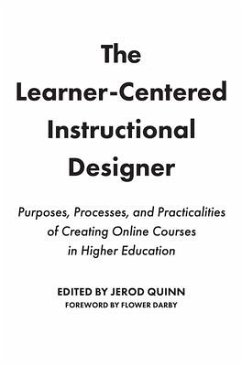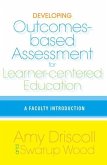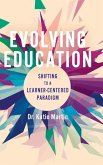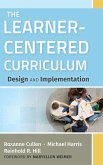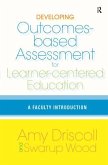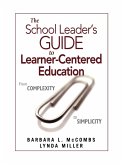The Learner-Centered Instructional Designer
Purposes, Processes, and Practicalities of Creating Online Courses in Higher Education
Herausgeber: Quinn, Jerod
The Learner-Centered Instructional Designer
Purposes, Processes, and Practicalities of Creating Online Courses in Higher Education
Herausgeber: Quinn, Jerod
- Gebundenes Buch
- Merkliste
- Auf die Merkliste
- Bewerten Bewerten
- Teilen
- Produkt teilen
- Produkterinnerung
- Produkterinnerung
This is a practical handbook for established and aspiring instructional designers in higher education, readers who may also be identified by such professional titles as educational developer, instructional technologist, or online learning specialist.
Andere Kunden interessierten sich auch für
![Developing Outcomes-Based Assessment for Learner-Centered Education Developing Outcomes-Based Assessment for Learner-Centered Education]() Amy DriscollDeveloping Outcomes-Based Assessment for Learner-Centered Education47,99 €
Amy DriscollDeveloping Outcomes-Based Assessment for Learner-Centered Education47,99 €![Helping Students Learn in a Learner-Centered Environment Helping Students Learn in a Learner-Centered Environment]() Terry DoyleHelping Students Learn in a Learner-Centered Environment39,99 €
Terry DoyleHelping Students Learn in a Learner-Centered Environment39,99 €![Evolving Education: Shifting to a Learner-Centered Paradigm Evolving Education: Shifting to a Learner-Centered Paradigm]() Katie MartinEvolving Education: Shifting to a Learner-Centered Paradigm35,99 €
Katie MartinEvolving Education: Shifting to a Learner-Centered Paradigm35,99 €![The Learner-Centered Curriculum The Learner-Centered Curriculum]() Roxanne CullenThe Learner-Centered Curriculum50,99 €
Roxanne CullenThe Learner-Centered Curriculum50,99 €![Developing Outcomes-Based Assessment for Learner-Centered Education Developing Outcomes-Based Assessment for Learner-Centered Education]() Amy DriscollDeveloping Outcomes-Based Assessment for Learner-Centered Education194,99 €
Amy DriscollDeveloping Outcomes-Based Assessment for Learner-Centered Education194,99 €![Learner-Centered Teaching Learner-Centered Teaching]() Terry DoyleLearner-Centered Teaching197,99 €
Terry DoyleLearner-Centered Teaching197,99 €![The School Leader's Guide to Learner-Centered Education The School Leader's Guide to Learner-Centered Education]() Barbara L. MccombsThe School Leader's Guide to Learner-Centered Education45,99 €
Barbara L. MccombsThe School Leader's Guide to Learner-Centered Education45,99 €-
-
-
This is a practical handbook for established and aspiring instructional designers in higher education, readers who may also be identified by such professional titles as educational developer, instructional technologist, or online learning specialist.
Hinweis: Dieser Artikel kann nur an eine deutsche Lieferadresse ausgeliefert werden.
Hinweis: Dieser Artikel kann nur an eine deutsche Lieferadresse ausgeliefert werden.
Produktdetails
- Produktdetails
- Verlag: Routledge
- Seitenzahl: 276
- Erscheinungstermin: 11. November 2020
- Englisch
- Abmessung: 235mm x 157mm x 19mm
- Gewicht: 554g
- ISBN-13: 9781642670400
- ISBN-10: 1642670405
- Artikelnr.: 60206108
- Herstellerkennzeichnung
- Libri GmbH
- Europaallee 1
- 36244 Bad Hersfeld
- gpsr@libri.de
- Verlag: Routledge
- Seitenzahl: 276
- Erscheinungstermin: 11. November 2020
- Englisch
- Abmessung: 235mm x 157mm x 19mm
- Gewicht: 554g
- ISBN-13: 9781642670400
- ISBN-10: 1642670405
- Artikelnr.: 60206108
- Herstellerkennzeichnung
- Libri GmbH
- Europaallee 1
- 36244 Bad Hersfeld
- gpsr@libri.de
Jerod Quinn, M.Ed, is an Instructional Designer for the Course Design and Technology department at the University of Missouri, where he works with faculty designing and creating online classes. He has been working as an instructional designer for almost a decade and in higher education for even longer. He has taught online classes in instructional design and face-to-face classes in educational technology. Leaning on his education, online teaching experience, and professional network, he works with faculty to create significant learning experiences online, face-to-face, and blended across disciplines. He's been a POD Network member for several years and is currently in pursuit of a Ph.D. in Educational Psychology with an emphasis in quantitative research from the University of Missouri.
Foreword-Flower Darby Acknowledgments Introducation. Always Learner
Centered-Jerod Quinn Part One. Instructional Design in Academia. A Common
Core with Different Approaches 1. Concierge Model. The Full-Service
Guide-Rayne Vieger 2. Consultation Model. At the End of the Day-Jerod Quinn
Part Two. Building Faculty Trust. You Can Trust Me, I'm a Professional 3.
Building Trust. Creating a Climate of Trust, Care, and Collaboration Among
Instructional Designers and Faculty-Christopher Grabau 4. Having
Boundaries. I'm Not Your Personal Assistant-Olena Zhadko 5. Faculty
Perspectives. A (Love?. Letter to Instructional Designers-Tom Warhover 6.
Grounded in Research. Be Good, or at Least Evidence Based-Johanna Inman
Part Three. Frameworks That Touch Everything. The Lenses We Work With 7.
Learning Online. The Internet Should be Used for More Than Just
Do-It-Yourself Videos-Josie G. Baudier 8. Universal Design for Learning.
Everybody Gets to Learn-Carl S. Moore 9. Decentralizing Whiteness. Where Do
We Start?-German E. Vargas Ramos 10. Motivation for Learning. If We Build
it, Will They Come?-Traci Stromie 11. Metacognition and Reflection. How We
Know What We Know and Don't Know-Kathryn E. Linder 12. Leveraging
Technology. It's New and Shiny, So It Must Be Good for Learning-Bonni
Stachowiak Part Four. Components of Online Classes. Practical Evergreens
13. Course Structure. Spend Time Engaging With Course Materials, Not
Hunting for Them-German E. Vargas Ramos 14. Multimedia. Moving Beyond
Passive to Active Learner Engagement-Danilo M.Baylen, Jonathan Gratch, and
Linda Haynes 15. Group Work. Online Collaboration Isn't Always
Horrible-Emily Goldstein 16. Synchronous Learning. Good to See You
Again-David Wicks and Annie Tremonte 17. Discussion Forums. Our Love-Hate
Relationship With Discussion Forums-Shannon Riggs 18. Presence. Online
Courses Still Have to Be Taught-Olena Zhadko 19. Remote Instructional
Design. The Best We Can-Tammy M. McCoy and Jerod Quinn Conclusion. A Day in
the Life-Jerod Quinn Annotated Biographies Editor and Contributors Index
Centered-Jerod Quinn Part One. Instructional Design in Academia. A Common
Core with Different Approaches 1. Concierge Model. The Full-Service
Guide-Rayne Vieger 2. Consultation Model. At the End of the Day-Jerod Quinn
Part Two. Building Faculty Trust. You Can Trust Me, I'm a Professional 3.
Building Trust. Creating a Climate of Trust, Care, and Collaboration Among
Instructional Designers and Faculty-Christopher Grabau 4. Having
Boundaries. I'm Not Your Personal Assistant-Olena Zhadko 5. Faculty
Perspectives. A (Love?. Letter to Instructional Designers-Tom Warhover 6.
Grounded in Research. Be Good, or at Least Evidence Based-Johanna Inman
Part Three. Frameworks That Touch Everything. The Lenses We Work With 7.
Learning Online. The Internet Should be Used for More Than Just
Do-It-Yourself Videos-Josie G. Baudier 8. Universal Design for Learning.
Everybody Gets to Learn-Carl S. Moore 9. Decentralizing Whiteness. Where Do
We Start?-German E. Vargas Ramos 10. Motivation for Learning. If We Build
it, Will They Come?-Traci Stromie 11. Metacognition and Reflection. How We
Know What We Know and Don't Know-Kathryn E. Linder 12. Leveraging
Technology. It's New and Shiny, So It Must Be Good for Learning-Bonni
Stachowiak Part Four. Components of Online Classes. Practical Evergreens
13. Course Structure. Spend Time Engaging With Course Materials, Not
Hunting for Them-German E. Vargas Ramos 14. Multimedia. Moving Beyond
Passive to Active Learner Engagement-Danilo M.Baylen, Jonathan Gratch, and
Linda Haynes 15. Group Work. Online Collaboration Isn't Always
Horrible-Emily Goldstein 16. Synchronous Learning. Good to See You
Again-David Wicks and Annie Tremonte 17. Discussion Forums. Our Love-Hate
Relationship With Discussion Forums-Shannon Riggs 18. Presence. Online
Courses Still Have to Be Taught-Olena Zhadko 19. Remote Instructional
Design. The Best We Can-Tammy M. McCoy and Jerod Quinn Conclusion. A Day in
the Life-Jerod Quinn Annotated Biographies Editor and Contributors Index
Foreword-Flower Darby Acknowledgments Introducation. Always Learner
Centered-Jerod Quinn Part One. Instructional Design in Academia. A Common
Core with Different Approaches 1. Concierge Model. The Full-Service
Guide-Rayne Vieger 2. Consultation Model. At the End of the Day-Jerod Quinn
Part Two. Building Faculty Trust. You Can Trust Me, I'm a Professional 3.
Building Trust. Creating a Climate of Trust, Care, and Collaboration Among
Instructional Designers and Faculty-Christopher Grabau 4. Having
Boundaries. I'm Not Your Personal Assistant-Olena Zhadko 5. Faculty
Perspectives. A (Love?. Letter to Instructional Designers-Tom Warhover 6.
Grounded in Research. Be Good, or at Least Evidence Based-Johanna Inman
Part Three. Frameworks That Touch Everything. The Lenses We Work With 7.
Learning Online. The Internet Should be Used for More Than Just
Do-It-Yourself Videos-Josie G. Baudier 8. Universal Design for Learning.
Everybody Gets to Learn-Carl S. Moore 9. Decentralizing Whiteness. Where Do
We Start?-German E. Vargas Ramos 10. Motivation for Learning. If We Build
it, Will They Come?-Traci Stromie 11. Metacognition and Reflection. How We
Know What We Know and Don't Know-Kathryn E. Linder 12. Leveraging
Technology. It's New and Shiny, So It Must Be Good for Learning-Bonni
Stachowiak Part Four. Components of Online Classes. Practical Evergreens
13. Course Structure. Spend Time Engaging With Course Materials, Not
Hunting for Them-German E. Vargas Ramos 14. Multimedia. Moving Beyond
Passive to Active Learner Engagement-Danilo M.Baylen, Jonathan Gratch, and
Linda Haynes 15. Group Work. Online Collaboration Isn't Always
Horrible-Emily Goldstein 16. Synchronous Learning. Good to See You
Again-David Wicks and Annie Tremonte 17. Discussion Forums. Our Love-Hate
Relationship With Discussion Forums-Shannon Riggs 18. Presence. Online
Courses Still Have to Be Taught-Olena Zhadko 19. Remote Instructional
Design. The Best We Can-Tammy M. McCoy and Jerod Quinn Conclusion. A Day in
the Life-Jerod Quinn Annotated Biographies Editor and Contributors Index
Centered-Jerod Quinn Part One. Instructional Design in Academia. A Common
Core with Different Approaches 1. Concierge Model. The Full-Service
Guide-Rayne Vieger 2. Consultation Model. At the End of the Day-Jerod Quinn
Part Two. Building Faculty Trust. You Can Trust Me, I'm a Professional 3.
Building Trust. Creating a Climate of Trust, Care, and Collaboration Among
Instructional Designers and Faculty-Christopher Grabau 4. Having
Boundaries. I'm Not Your Personal Assistant-Olena Zhadko 5. Faculty
Perspectives. A (Love?. Letter to Instructional Designers-Tom Warhover 6.
Grounded in Research. Be Good, or at Least Evidence Based-Johanna Inman
Part Three. Frameworks That Touch Everything. The Lenses We Work With 7.
Learning Online. The Internet Should be Used for More Than Just
Do-It-Yourself Videos-Josie G. Baudier 8. Universal Design for Learning.
Everybody Gets to Learn-Carl S. Moore 9. Decentralizing Whiteness. Where Do
We Start?-German E. Vargas Ramos 10. Motivation for Learning. If We Build
it, Will They Come?-Traci Stromie 11. Metacognition and Reflection. How We
Know What We Know and Don't Know-Kathryn E. Linder 12. Leveraging
Technology. It's New and Shiny, So It Must Be Good for Learning-Bonni
Stachowiak Part Four. Components of Online Classes. Practical Evergreens
13. Course Structure. Spend Time Engaging With Course Materials, Not
Hunting for Them-German E. Vargas Ramos 14. Multimedia. Moving Beyond
Passive to Active Learner Engagement-Danilo M.Baylen, Jonathan Gratch, and
Linda Haynes 15. Group Work. Online Collaboration Isn't Always
Horrible-Emily Goldstein 16. Synchronous Learning. Good to See You
Again-David Wicks and Annie Tremonte 17. Discussion Forums. Our Love-Hate
Relationship With Discussion Forums-Shannon Riggs 18. Presence. Online
Courses Still Have to Be Taught-Olena Zhadko 19. Remote Instructional
Design. The Best We Can-Tammy M. McCoy and Jerod Quinn Conclusion. A Day in
the Life-Jerod Quinn Annotated Biographies Editor and Contributors Index

